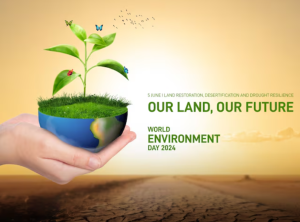Economic and ecological globalisation are driven by different imperatives and interests. Unfortunately, the current political structure of the world enables one and hampers the other.
India has emerged as a “voice” in climate change and trade negotiations. In 2013, at the World Trade Organisation talks in Bali, the Indian government was insistent that the rights of poor farmers not be compromised. It has consistently raised the matter of equity in the sharing of global atmospheric space. The already industrialised countries say India is obstinate, strident and unnecessarily obstructionist in crucial global debates. The problem is not that India is loud – that it has to be. But there is a fundamental weakness in the rules that govern ecological and economic globalisation. In other words, political globalisation is weak and compromised because of the dominant self-interest of powerful countries. So, the real problem, in my view, is that India is loud but not clear. It, therefore, makes noise but does not achieve its stated goal: to protect the interests of the poorest in the world.
But first let us understand the two processes. It was in the early 1990s that the world first finalised the climate agreement. The UN Framework Convention on Climate Change was signed in 1992 at the Rio Conference. This climate agreement was needed because economic growth had overrun the ecological boundaries of the planet. The stock of greenhouse gas emissions was already more than what the earth’s natural cleaning system—sinks in the form of oceans, atmosphere, forests and soil—could absorb. The world needed an agreement to reduce emissions resulting from economic growth. But most importantly, these emissions were no longer the problem of any one country. In fact, it was clear that the levels of production and consumption had reached a tipping point under which the actions of one country within its boundaries were likely to have major and devastating impact on others.
Consider this: by then the world had learnt that a simple home refrigerator that used a chemical called chlorofluorocarbon (CFC) could literally blow a hole in the ozone layer, leading to skin cancer in various parts of the world. Traces of persistent organic compounds like DDT—a pesticide used for virtually everything at the time—were found in the breast milk of women living in a faraway Arctic region. Ocean currents and air streams knew no national barriers and carried these chemicals across the globe.
The world was interconnected, brought together by the excesses of economic growth. So it was not good enough to set rules in individual countries to mitigate environmental damage. Countries could not act alone to deal with these challenges. It was time to create new rules for a global system of environmental governance. Since then the world has stitched up many agreements, from the ones on the protection of the ozone layer and climate change to those on the management of hazardous waste, elimination of persistent organic pollutants
like DDT and in 2013, on mercury use. These agreements together form the architecture for ecological globalisation.
Simultaneously, in the 1990s, another global process was under way—the setting up of a multilateral trading system under WTO. This economic globalisation would take production and consumption to new places and higher levels. It would no longer be possible to live within planetary boundaries. Instead, the trading system enjoined all countries to the same pattern of growth and its toxic fallout.
This is where the world is today, some twenty years later. It has changed and yet not changed at all. On the one hand, manufacturing has moved to new countries and so have greenhouse gas emissions. In 1990, industrialised countries collectively accounted for 70 percent of annual global emissions. In 2010, they accounted for 43 percent. In 1990, China, with over a quarter of the world’s population, was responsible for only 10 percent of annual emissions. By 2012, it contributed 27 percent.
On the other hand, there has been no change in the way the world does business. In global trade negotiations the West has simply played games to move them from one box to another – renamed them and reworked them. The farmers of the developing world continue to be at a huge disadvantage. Similarly, in climate negotiations, the West has not committed to reducing its emissions and so countries like China occupy the limited ecological space still available for emissions. In the process, the world has run out of atmospheric space and certainly out of time.
The fight is now even more strongly contested and nasty. In climate change negotiations, the industrialised West wants to dump the 1992 agreement and their emissions ceilings under it and share atmospheric space with growing countries. They say the world has changed—emerging countries are now their competitors in trade and pollution, and they cannot make any concessions. In agriculture, they want restrictions in the subsidy bills of developing countries. At the recent WTO meet in Bali, the support price paid to poor farmers was projected as a distortion of global trade, despite the Indian government’s stiff opposition. The final Bali deal is ambiguous and could well hit support to poor farmers in the future.
This is the crux of the issue. When governments decide on policies, they have to pay heed to inclusive and equitable growth. When markets decide on policies, they only need to mind profits. In Europe, governments have conceded policy control to a faceless bureaucracy in Brussels. They have to balance this loss of control by decentralising and devolving power to the people. Making this work is not always easy, as Brexit has shown.
In the end, it reveals a fatal flaw in the current model of globalisation that forces national governments to cede power, without providing global leadership at the very top. When governments discuss global matters, they are guided by national self-interest. From climate change to wars in Iraq and Syria, it is about muscle power at the very top. But in each instance, we have to ask who made the decision? In whose interest and how was it taken? It is clear that the dismemberment of the United Nations is costing the world today.
Those bubble-wrapped in their ‘comfort’ views have been pricked. Now it is for them to make a new and more inclusive world.
Sunita Narain is the Director General of the Centre for Science and Environment, a public interest research and advocacy organisation based in New Delhi.



